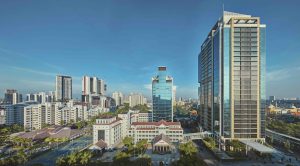Converting Residential Property To Commercial Property
Share story

This trend is seeing a surge in the market as residential properties are usually significantly lower than residential new-builds
Famous spots in town such as SS2, Petaling Jaya and Jalan Telawi, Bangsar are known for their rows and rows of houses being turned into business centres or even boutiques. The bridal shops along SS2 all used to be houses, but due to it’s strategic location, and the trend of converting, these spots are now open for businesses and attract a good number of customers.
But what is the process of doing so and can it even be done? Conversion of land can be applied by owners if they wish to change the land usage or land classification in order to have better bank-able value, or prior to development purposes. Conversion will only be approved upon fulfilling certain conditions.
PROS AND CONS
This trend is seeing a surge in the market as residential properties are usually significantly lower than residential new-builds due to the saturated commercial market. However, there are cons to having go through this process. You have to think of all the additional costs incurred, renovations and alterations done. Most of your costs will go into hiring skilled workers competent enough to comply with work standards for a residential standard. If you are renovating or extending a shop front then you would normally be required to apply for regular planning permission. In addition to that, if you are looking to convert a commercial property in a market town, it may be that the fascia of the building must be kept to look the same as those in the surrounding area, due to a covenant. This could impact the cost of the project if specific materials are required to undertake the work.
For managing partner of PDI Design & Associates, Dato’ Tan Su Cheng says his property was renovated from a two storey building to three and a half storeys, around 3,000 sqft to a whopping 11,000 sqft off the main road in Bangsar. “It was really an easy process, I did not encounter any hiccups along the way, in fact it was very smooth,” shares Tan.
However, other negatives that must be considered, such as whether there is a school close by, or the noise that you may be subjected to if the property is situated close to pubs, clubs, bars or takeaway shops. If there are already some residential properties nearby, you may even want to knock on a few doors and find out how the residents find living in the area. The waiting game, if you have weighed all of the above factors up and still feel that converting a commercial property is the right move for you, there is one final consideration; available time. Many local authorities have in place a policy whereby they will only consider changing the use of a property from commercial to residential title, if the owner can prove that there is not a market for it in its current state in order to satisfy the local authorities’ requirements.



THE NITTY GRITTY
Cafe owner, Effendy Nazri of Grind22, changed the residential title of his shop. He shares some insights. “The owner has to take full responsibility to obtain the Approval Permit, planning plans, Architecture plans, Monitoring and Evaluation (M&E) engineering plans for submission,” says Effendy. “The process usually takes around 60 to 90 days depending on how fast the authorities process the documents. And if you’re planning on converting your property, it will set you back around RM 25k to RM 50k, depending on the structure, size and commercial category used which can be either kindergartens, show units or common businesses,” says consultant Maxim from Maxime City Consultant.“The whole process for PDI Design & Associates took around a year for everything,” shares Tan.
The possible quota of area allowed is dependent on the nature of business, so that needs to be researched thoroughly beforehand. “The first few hiccups that we had were pertaining the auditing, planning, and when we had to submit all these to Bomba. Then there was the building part, which requires workmanship from those who have experience. Don’t hire cheap labour for the sake of saving costs. Spend more for a better result, be it a runner or an agent, or even a consultant,” Effendy advises. “The more help you get from people with connections and experience means a faster process for you,” adds Effendy.
While there are many pros to converting your piece of property to a commercial one, there are many factors to be taken into consideration whilst doing so, not just for the residents surrounding the area, but also for the sake of your future customers as well. However, it is not a trend that will die off soon, in fact, more and more people are moving towards opening coffee shops and show rooms in residential areas.


